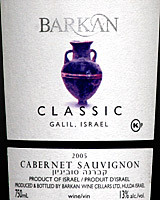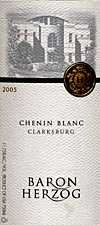The joyous holiday of Passover begins at sundown on Friday, celebrating the birth of the Jewish nation when Moses led the Israelites out of slavery in Egypt. Observant Jews around the world will gather for the Seder dinner, a family feast including traditional dishes, prayer ... and four glasses of wine.
Many people think of kosher wine as a thick, sweet and grapey beverage, but that tradition is based more on culture than religion. In the United States more than a century ago, many Jewish immigrants lived in the Northeast, where producers had easy access to Concord and other native American grapes with a characteristic "grape-jelly" flavor that needs sweetening to make it palatable. Necessity became the mother of tradition, and for many years "kosher" in wine - at least in the U.S. - almost always meant heavy and sweet.
In fact, in modern times, many Jewish wine makers in the U.S., in Israel and in many other countries are producing dry, elegant table wines that stand fully in the European fine-wine tradition and fully kosher.
"Kosher," after all, simply means "fit and proper" in Hebrew, referring to any food or drink that conforms to Jewish dietary laws and is made under the supervision of a rabbi.
Since wine normally contains neither meat nor dairy products, the rules regarding its kosher status are more subtle than merely refraining from pork or shellfish or mixing meat and dairy at the same table. Specifically:
* The wine-making equipment must be used exclusively for kosher products.
* Only Sabbath-observant Jews may handle the wine throughout production, from crushing the grapes to serving the wine. (There's an exception to this, however: If the wine is boiled or pasteurized - "mevushal," in Hebrew - it may be handled by anyone, Jewish or otherwise, without being rendered unfit.)
* No non-kosher product may be used to make kosher wine. This provision, coincidentally, makes kosher wine of interest to strict vegetarians, who can be reasonably certain that kosher wines have not used animal products in the "fining" or clarification process.
None of these rules prevent making wines in an international style, and indeed, many modern kosher wines have won awards in major competitions.
As I wrote in a previous discussion of kosher wines (30 Second Wine Advisor, April 9, 2001), "As a category, they're certainly worth consideration by wine lovers of all heritages. To paraphrase the Levy's Rye Bread commercials of the '60s, just as you don't have to be French or Italian to enjoy the great wines of those countries, or any other, you don't have to be Jewish to enjoy kosher wine."
Kosher wines not made with the mevushal process mentioned above need be no different in style or taste from any other wine. The fruit and wine-making processes are identical, and from a gustatory standpoint, so is the finished product.
Mevushal is a bit more iffy because it involves heating the wine, a process akin to "flash pasteurization" or the accidental instance of "cooking" a wine by exposure to extreme heat in transportation or storage. Both the wines in today's tasting are mevushal, and I suspect it's no coincidence that both of them display a distinctly jammy, stewed-fruit character that's not unpleasant but that may compromise the long-term cellar-worthiness of the wine. If you purchase a mevushal wine, for religious reasons or merely for enjoyment, I suggest drinking it up within a year or two.
 Barkan 2005 "Classic" Galil Cabernet Sauvignon ($10.99)
Barkan 2005 "Classic" Galil Cabernet Sauvignon ($10.99)Very dark garnet with a clear violet edge. Very ripe and forward fruit, more like strawberry jam than fresh berries, with a hint of something more like a fruit cordial or liqueur behind it. Pleasant enough but a bit unusual; perhaps a result of the mevushal heating process? The flavor is pleasant, too, strawberries framed with crisp, mouth-watering acidity and a distinct touch of tannic astringency. Overall, a decent Cabernet by any standard, and well above the median at its relatively low-end price. U.S. importer: Royal Wine Corp., NYC. (April 13, 2008)
FOOD MATCH: This fruity Cabernet would go well with Passover lamb or any red meat. It was fine with a vegetarian alternative, pan-fried tofu with spinach, brought up to red wine with a rich brown soy-hoisin-based sauce and plenty of garlic and ginger.
VALUE: If you like Cabernet in a fruit-forward style, this one is worth consideration for the budget buyer whether you're in the market for kosher wine or any modest wine.
WHEN TO DRINK: Not really a cellar keeper, as the forward fruit seems likely to fade before the tannins resolve. Drink up.
FIND THIS WINE ONLINE:
Check prices and look for sources for Barkan "Classic" Cabernet on Wine-Searcher.com:
http://www.wine-searcher.com/find/Barka ... g_site=WLP
 Baron Herzog 2005 Clarksburg Chenin Blanc ($8.99)
Baron Herzog 2005 Clarksburg Chenin Blanc ($8.99)Transparent light gold. The first aroma hits with a very distinct cooked-peach note, almost akin to peach nectar or the juice from a jar of canned peaches. There's something more fresh, a hint of ripe pears and apples, behind it, giving the overall impression of a bowl of very juicy white fruit. Despite the tutti-frutti aromas, the flavor profile is light, crisp and almost dry, perhaps just a touch of off-dry sweetness well offset with fresh-fruit acidity. Not a bad white wine at all, and it serves well at any table, Passover or otherwise. (April 12, 2008)
FOOD MATCH: The producer recommends veal, poultry or, generically, "Oriental dishes." I would add fresh, white-fleshed fish as a worthy companion.
VALUE: If you're in the market for a very fruity, jammy white wine with a touch of sweetness, you'll be hard-pressed to improve on this price tag.
WHEN TO DRINK: The winery recommends drinking it within a year or two after the vintage. This one is holding up better than that, but I wouldn't recommend it for long-term aging.
FIND THIS WINE ONLINE:
Compare prices and find vendors for Baron Herzog Chenin Blanc on Wine-Searcher.com:
http://www.wine-searcher.com/find/Herzo ... g_site=WLP

